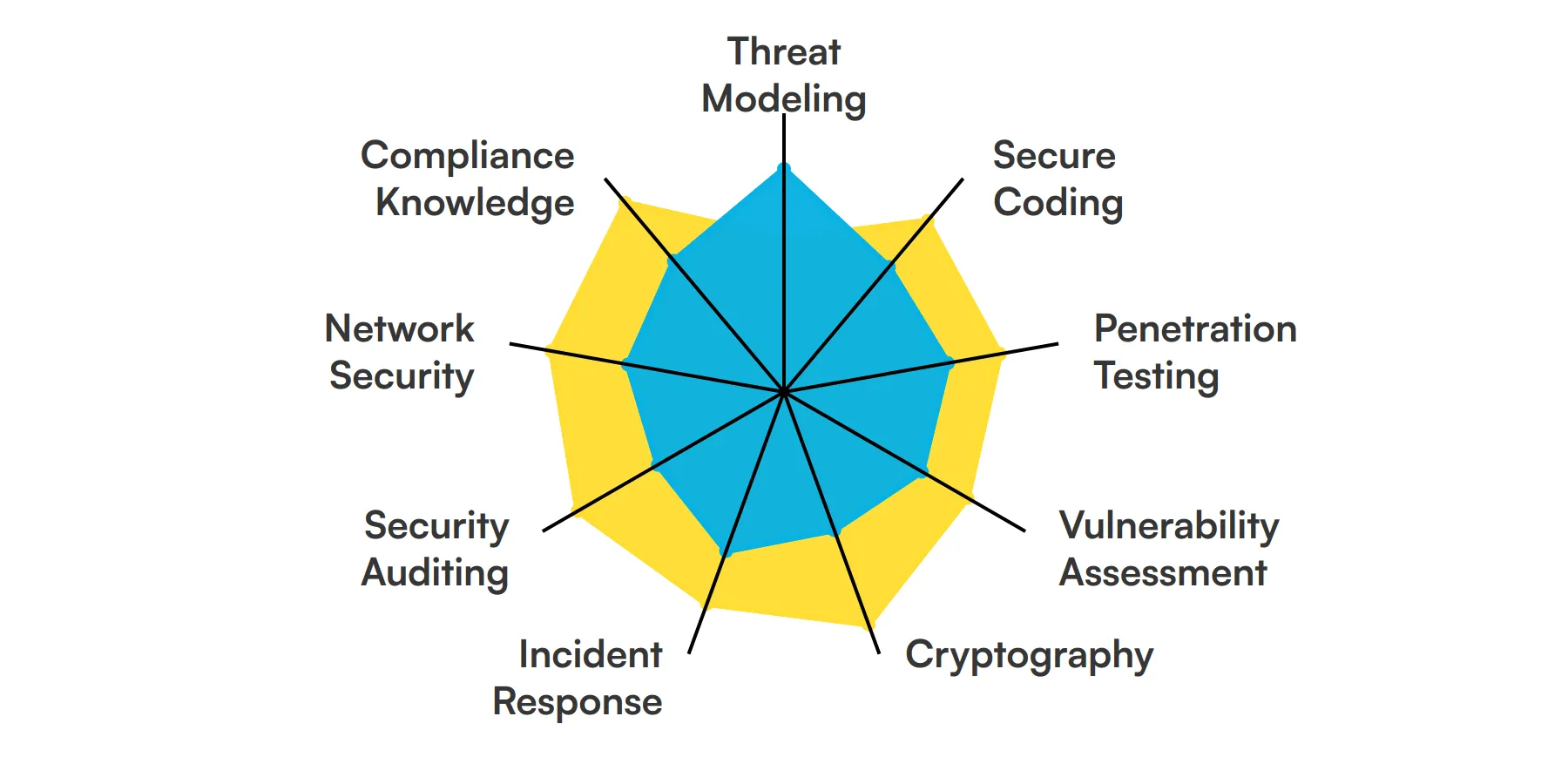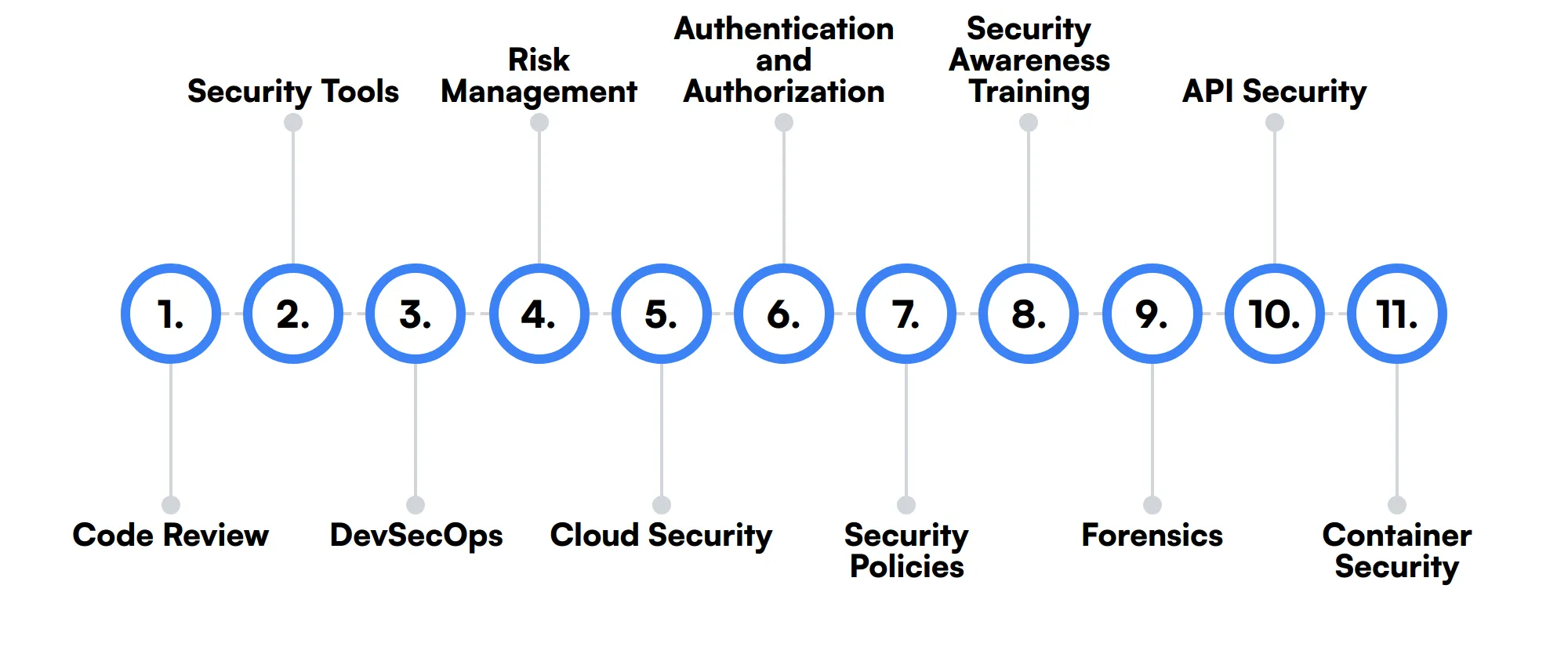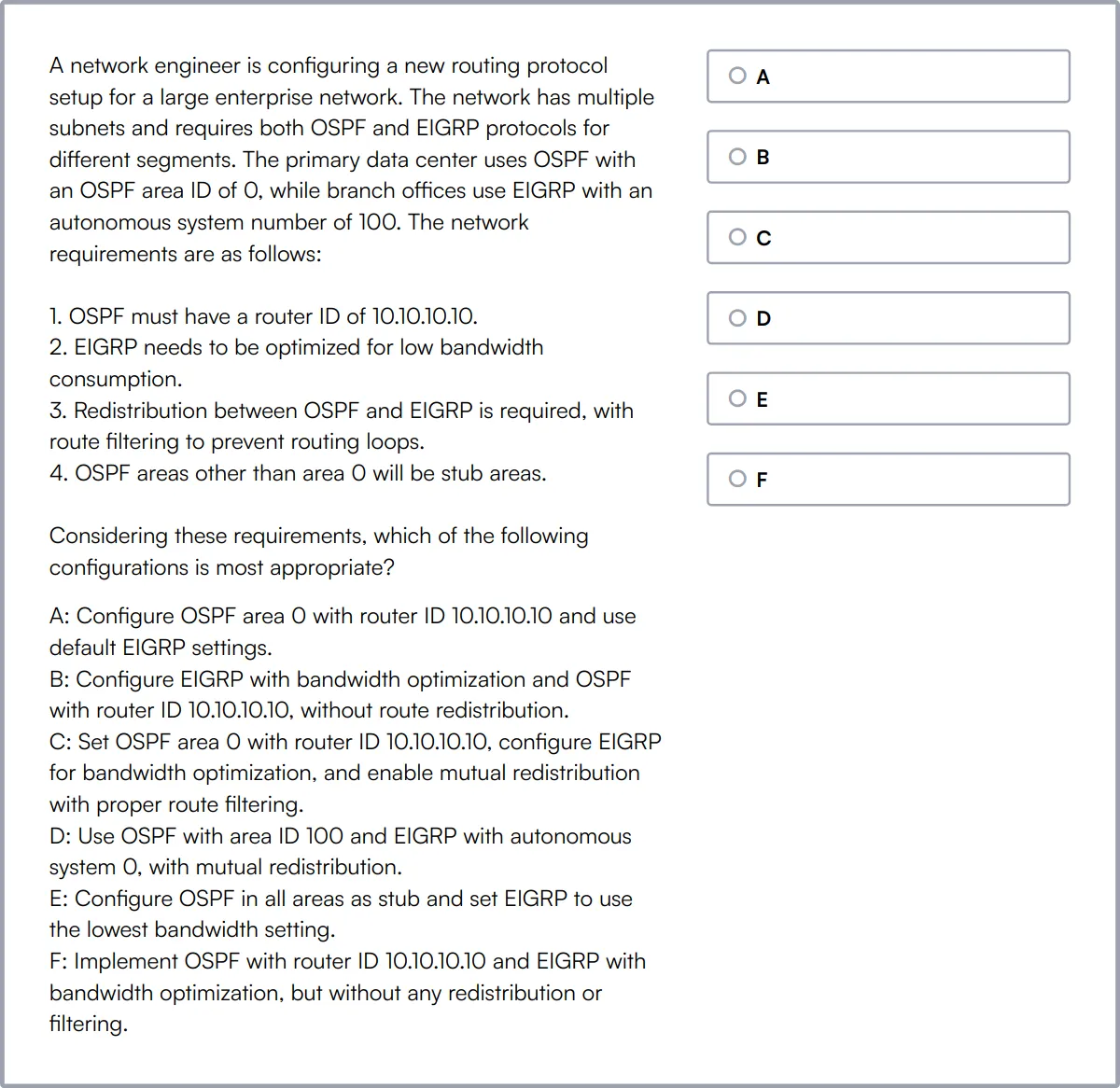Application Security Engineers play a critical role in protecting software applications from vulnerabilities and attacks. Their work is crucial in ensuring that applications are secure from the design phase through to deployment and beyond.
Skills required for this role include a deep understanding of cybersecurity principles, proficiency in various security tools and practices, and the ability to communicate security risks and solutions effectively.
Candidates can write these abilities in their resumes, but you can’t verify them without on-the-job Application Security Engineer skill tests.
In this post, we will explore 9 essential Application Security Engineer skills, 11 secondary skills and how to assess them so you can make informed hiring decisions.
Table of contents
9 fundamental Application Security Engineer skills and traits
The best skills for Application Security Engineers include Threat Modeling, Secure Coding, Penetration Testing, Vulnerability Assessment, Cryptography, Incident Response, Security Auditing, Network Security and Compliance Knowledge.
Let’s dive into the details by examining the 9 essential skills of a Application Security Engineer.

Threat Modeling
Threat modeling involves identifying potential security threats and vulnerabilities in an application. An Application Security Engineer uses this skill to anticipate and mitigate risks before they can be exploited by attackers.
Check out our guide for a comprehensive list of interview questions.
Secure Coding
Secure coding is the practice of writing software in a way that guards against security vulnerabilities. This skill ensures that the codebase is resilient to attacks such as SQL injection, cross-site scripting, and buffer overflows.
Penetration Testing
Penetration testing involves simulating cyberattacks to identify security weaknesses. An Application Security Engineer uses this skill to test the robustness of applications and uncover vulnerabilities that need to be addressed.
Vulnerability Assessment
Vulnerability assessment is the process of identifying, quantifying, and prioritizing vulnerabilities in a system. This skill helps in maintaining a secure application environment by regularly scanning for and addressing potential security issues.
Cryptography
Cryptography is the practice of securing information by transforming it into an unreadable format. An Application Security Engineer uses cryptographic techniques to protect sensitive data and ensure its confidentiality and integrity.
Incident Response
Incident response involves managing and addressing security breaches or attacks. This skill is crucial for an Application Security Engineer to quickly and effectively respond to security incidents, minimizing damage and restoring normal operations.
For more insights, check out our guide to writing a Incident Manager Job Description.
Security Auditing
Security auditing is the process of reviewing and evaluating the security measures of an application. An Application Security Engineer conducts audits to ensure compliance with security policies and identify areas for improvement.
Network Security
Network security involves protecting the integrity, confidentiality, and availability of data as it is transmitted across networks. This skill is essential for safeguarding applications from network-based attacks.
Check out our guide for a comprehensive list of interview questions.
Compliance Knowledge
Compliance knowledge involves understanding and adhering to legal and regulatory requirements related to application security. An Application Security Engineer ensures that applications meet industry standards and regulations.
11 secondary Application Security Engineer skills and traits
The best skills for Application Security Engineers include Code Review, Security Tools, DevSecOps, Risk Management, Cloud Security, Authentication and Authorization, Security Policies, Security Awareness Training, Forensics, API Security and Container Security.
Let’s dive into the details by examining the 11 secondary skills of a Application Security Engineer.

Code Review
Code review is the practice of examining source code to identify and fix security vulnerabilities. This skill helps in maintaining a secure codebase by catching issues early in the development process.
Security Tools
Familiarity with security tools such as static and dynamic analysis tools, intrusion detection systems, and firewalls is important. These tools assist an Application Security Engineer in identifying and mitigating security threats.
DevSecOps
DevSecOps integrates security practices into the DevOps process. This skill ensures that security is considered at every stage of the software development lifecycle, from planning to deployment.
Risk Management
Risk management involves identifying, assessing, and prioritizing risks to minimize their impact. This skill helps an Application Security Engineer in making informed decisions about security measures.
Cloud Security
Cloud security focuses on protecting data and applications hosted in cloud environments. This skill is increasingly important as more organizations move their operations to the cloud.
Authentication and Authorization
Authentication and authorization are processes that ensure only authorized users can access certain resources. This skill is crucial for implementing secure access controls in applications.
Security Policies
Understanding and implementing security policies helps in establishing a secure framework for application development and deployment. This skill ensures that security best practices are followed consistently.
Security Awareness Training
Security awareness training involves educating team members about security best practices and potential threats. This skill helps in fostering a security-conscious culture within the organization.
Forensics
Forensics involves investigating and analyzing security breaches to understand how they occurred. This skill is useful for an Application Security Engineer in learning from incidents and preventing future attacks.
API Security
API security focuses on protecting the interfaces that allow applications to communicate with each other. This skill is essential for ensuring that APIs are not vulnerable to attacks.
Container Security
Container security involves securing containerized applications and their environments. This skill is important as containerization becomes more prevalent in modern application development.
How to assess Application Security Engineer skills and traits
Assessing the skills and traits of an Application Security Engineer can be a challenging task. It's not just about knowing the right tools and techniques, but also about understanding how to apply them effectively in real-world scenarios. From threat modeling and secure coding to penetration testing and vulnerability assessment, these professionals need a diverse set of skills to protect applications from various security threats.
Traditional resumes and certifications might give you a glimpse of a candidate's background, but they don't provide a complete picture of their practical abilities. This is where skills-based assessments come into play. By using targeted assessments, you can evaluate a candidate's proficiency in key areas such as cryptography, incident response, security auditing, network security, and compliance knowledge.
To streamline this process, Adaface on-the-job skill tests offer a reliable solution. These assessments help you achieve a 2x improved quality of hires and an 85% reduction in screening time. With Adaface, you can build a comprehensive assessment tailored to your specific needs, ensuring you find the right fit for your Application Security Engineer role.
Let’s look at how to assess Application Security Engineer skills with these 5 talent assessments.
SQL Coding Test
Our SQL Coding Test evaluates a candidate's ability to design and build relational databases and tables from scratch, apply CRUD options, write queries and subqueries to filter data, and create indexes for faster SQL queries.
The test assesses their understanding of creating databases, CRUD operations, joins, subqueries, and conditional expressions. It also evaluates their ability to work with views, indexes, string functions, and mathematical functions.
Successful candidates demonstrate proficiency in creating and managing databases, writing efficient SQL queries, and optimizing database performance through indexing and other techniques.
Penetration Testing Test
Our Penetration Testing Test evaluates a candidate's knowledge and skills in penetration testing, network security, vulnerability assessment, ethical hacking, and web application security.
The test assesses their ability to identify vulnerabilities, exploit them ethically, and provide recommendations for improving the security posture of systems and applications. It covers topics such as network security, web application security, and vulnerability assessment.
High-scoring candidates show a deep understanding of penetration testing methodologies, network security principles, and the ability to conduct thorough vulnerability assessments.
Cryptography Test
Our Cryptography Test evaluates a candidate's knowledge of cryptography concepts, network engineering, and cyber security.
The test covers digital signatures, cryptography algorithms like RSA, hashing techniques, encoding and decoding, and cyber security fundamentals.
Candidates who perform well demonstrate a strong grasp of cryptographic principles, secure communication methods, and the ability to implement cryptographic solutions in various scenarios.
CISCO Security Online Test
Our CISCO Security Online Test uses scenario-based MCQs to evaluate candidates on their understanding of network security concepts and Cisco network security products and solutions.
The test assesses knowledge of security technologies such as firewalls, VPNs, intrusion prevention, and content security. It also evaluates the ability to design and implement secure network architectures using Cisco products.
Successful candidates demonstrate proficiency in using Cisco security appliances, understanding network threats and vulnerabilities, and applying security policies and best practices.

GDPR Online Test
Our GDPR Online Test uses scenario-based MCQs to evaluate candidates on their understanding of GDPR regulations and best practices for data protection and privacy.
The test assesses the ability to identify and evaluate data protection risks, develop and implement GDPR compliance policies, and ensure the security and privacy of personal data. It covers topics such as data privacy, data breach, consent management, and data subject rights.
High-scoring candidates show a thorough understanding of GDPR requirements, data protection strategies, and the ability to manage data privacy effectively.
Summary: The 9 key Application Security Engineer skills and how to test for them
| Application Security Engineer skill | How to assess them |
|---|---|
| 1. Threat Modeling | Evaluate ability to identify and mitigate potential security threats. |
| 2. Secure Coding | Assess knowledge of writing code that defends against security vulnerabilities. |
| 3. Penetration Testing | Test skills in attacking systems to find and exploit weaknesses. |
| 4. Vulnerability Assessment | Measure capability to scan and identify system vulnerabilities. |
| 5. Cryptography | Check understanding of encrypting and decrypting data securely. |
| 6. Incident Response | Assess readiness and effectiveness in handling security breaches. |
| 7. Security Auditing | Evaluate skills in conducting thorough security checks and compliance. |
| 8. Network Security | Test knowledge of securing networks against unauthorized access. |
| 9. Compliance Knowledge | Verify understanding of relevant security standards and laws. |
Ethical Hacking Test
Application Security Engineer skills FAQs
What skills are necessary for an Application Security Engineer?
Application Security Engineers should be proficient in security testing, threat modeling, secure coding, and cryptography. They also need a strong understanding of compliance, incident response, and various security protocols.
How can recruiters assess secure coding skills in candidates?
Recruiters can assess secure coding skills by reviewing candidates' previous projects, asking for code samples, or conducting practical coding tests that include security-focused challenges.
What is the importance of threat modeling in application security?
Threat modeling helps identify potential security threats and vulnerabilities early in the development process, allowing teams to mitigate risks before software deployment.
Can you explain the role of cryptography in application security?
Cryptography secures information by transforming it into a secure format that only authorized parties can access, crucial for protecting data integrity and confidentiality in applications.
What should a recruiter look for when evaluating knowledge of compliance in application security?
Recruiters should look for familiarity with industry-specific regulations, such as GDPR or HIPAA, and experience in implementing security controls that meet compliance requirements.
How does security automation enhance the role of an Application Security Engineer?
Security automation streamlines repetitive tasks, reduces errors, and speeds up response times to threats, allowing security engineers to focus on more complex security issues.
What is the significance of incident response capabilities in an Application Security Engineer?
Incident response capabilities are key to quickly addressing and mitigating the impact of security breaches, ensuring minimal damage and restoring systems to normal operations.
How can project management skills benefit an Application Security Engineer?
Project management skills help Application Security Engineers to plan, execute, and monitor security projects effectively, ensuring that security measures are integrated throughout the project lifecycle.

40 min skill tests.
No trick questions.
Accurate shortlisting.
We make it easy for you to find the best candidates in your pipeline with a 40 min skills test.
Try for freeRelated posts
Free resources



